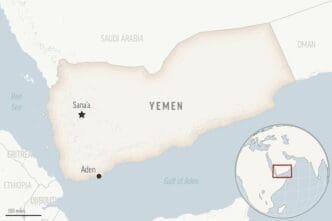In a significant development, Israeli airstrikes have hit Yemen’s Houthi-controlled capital and a key port city following an attempted missile attack targeting central Israel.
DUBAI – Israeli airstrikes targeted strategic sites in Yemen’s capital and a port city early Thursday, killing at least nine individuals, according to officials. This response followed a missile launched by the Houthi rebels, reportedly intercepted by the Israeli military before entering Israeli airspace. The attacks are seen as a potential escalation of ongoing tensions with the Iranian-backed Houthi group, notorious for disrupting the Red Sea’s vital shipping routes.
The Houthi-operated satellite channel, al-Masirah, reported that the Israeli strikes targeted power stations in the capital and the Ras Isa oil terminal on the Red Sea. Notably, seven fatalities occurred near the Salif port, while two more were reported at the Ras Isa oil terminal, as per the channel’s correspondent in Hodeida.
Rear Admiral Daniel Hagari, speaking for the Israeli military, mentioned that the strikes focused on energy and port infrastructure. ‘The targets struck by the Israeli military were used by Houthi forces for military purposes,’ he stated. ‘These operations degrade the Houthi terrorist regime’s capability to exploit these sites for military and terrorist activities, including the smuggling of Iranian weapons.’ Despite these assertions, the Israeli military has not provided specific damage assessments or details on the targeted sites.
Tensions have been rising since the ongoing conflict between Israel and the Gaza-based Hamas militant group, with Houthi forces reportedly becoming more assertive in their attacks on international shipping. Since October 2023, during the Israel-Hamas conflict, Houthi actions have resulted in one sunken vessel and multiple attacks on nearly 100 merchant ships. The Houthis argue these actions target vessels linked to Israel or Western nations as a form of protest against the actions in Gaza.
The region’s volatility further intensified when American forces conducted air strikes aimed at Houthi command centers in Yemen, reflecting broader international concerns about the Houthis’ growing influence and their ability to disrupt international trade. Although the United States did not participate in the recent Israeli strikes, it remains involved in balancing actions against the Houthis with diplomatic efforts to support Saudi Arabia’s desire for a lasting ceasefire amid Yemen’s prolonged conflict.
Despite the intense Israeli response, the Houthis have yet to claim responsibility for the missile. They hinted at an impending military announcement, continuing their pattern of strategic communication following attacks. This announcement comes after previous hostilities, including the missile targeting Israel’s Ben Gurion airport as Prime Minister Benjamin Netanyahu landed.
As the conflict endures, the humanitarian situation in Yemen remains dire. The war, which has lasted over a decade, has claimed more than 150,000 lives, including a significant number of civilians, and created one of the world’s most severe humanitarian crises. The port of Hodeida, essential for food imports, has been a focal point in these military confrontations, raising fears of further disruptions that could exacerbate Yemen’s humanitarian needs.
The recent Israeli airstrikes in Yemen mark a new phase in the ongoing regional conflict, emphasizing heightened tensions and the potential for further escalation. As the humanitarian crisis deepens, the situation poses significant challenges for both regional stability and international shipping lanes. Observers will be closely monitoring how these developments unfold amidst complex geopolitical dynamics.
Source: News4jax







